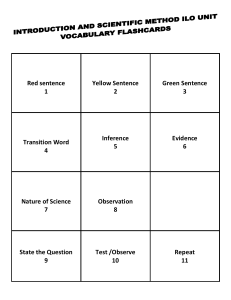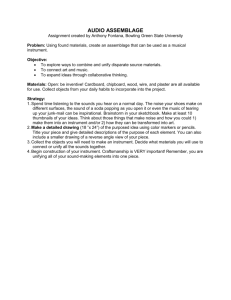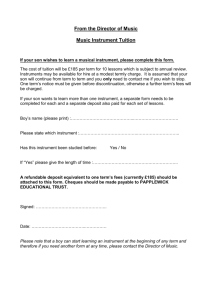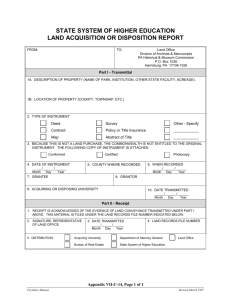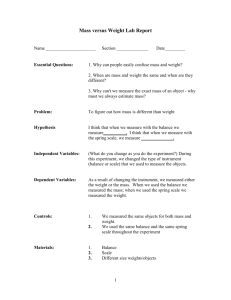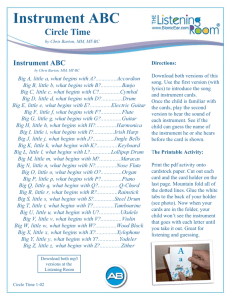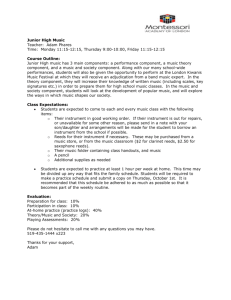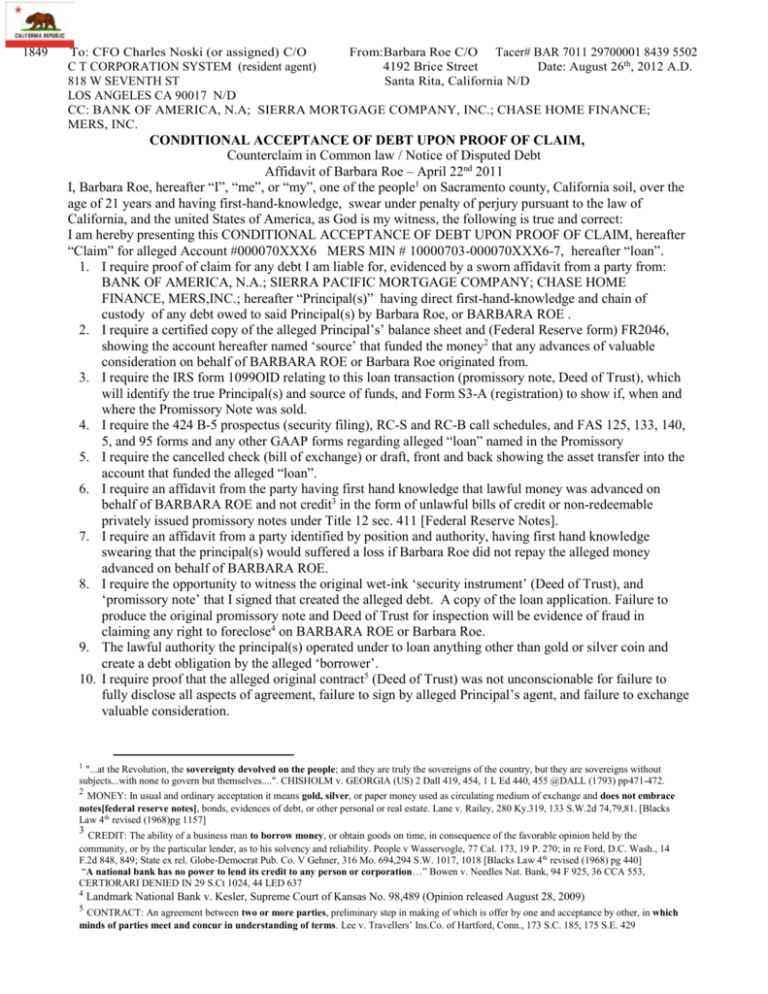
1849
To: CFO Charles Noski (or assigned) C/O
From:Barbara Roe C/O Tacer# BAR 7011 29700001 8439 5502
C T CORPORATION SYSTEM (resident agent)
4192 Brice Street
Date: August 26th, 2012 A.D.
818 W SEVENTH ST
Santa Rita, California N/D
LOS ANGELES CA 90017 N/D
CC: BANK OF AMERICA, N.A; SIERRA MORTGAGE COMPANY, INC.; CHASE HOME FINANCE;
MERS, INC.
CONDITIONAL ACCEPTANCE OF DEBT UPON PROOF OF CLAIM,
Counterclaim in Common law / Notice of Disputed Debt
Affidavit of Barbara Roe – April 22nd 2011
I, Barbara Roe, hereafter “I”, “me”, or “my”, one of the people1 on Sacramento county, California soil, over the
age of 21 years and having first-hand-knowledge, swear under penalty of perjury pursuant to the law of
California, and the united States of America, as God is my witness, the following is true and correct:
I am hereby presenting this CONDITIONAL ACCEPTANCE OF DEBT UPON PROOF OF CLAIM, hereafter
“Claim” for alleged Account #000070XXX6 MERS MIN # 10000703-000070XXX6-7, hereafter “loan”.
1. I require proof of claim for any debt I am liable for, evidenced by a sworn affidavit from a party from:
BANK OF AMERICA, N.A.; SIERRA PACIFIC MORTGAGE COMPANY; CHASE HOME
FINANCE, MERS,INC.; hereafter “Principal(s)” having direct first-hand-knowledge and chain of
custody of any debt owed to said Principal(s) by Barbara Roe, or BARBARA ROE .
2. I require a certified copy of the alleged Principal’s’ balance sheet and (Federal Reserve form) FR2046,
showing the account hereafter named ‘source’ that funded the money2 that any advances of valuable
consideration on behalf of BARBARA ROE or Barbara Roe originated from.
3. I require the IRS form 1099OID relating to this loan transaction (promissory note, Deed of Trust), which
will identify the true Principal(s) and source of funds, and Form S3-A (registration) to show if, when and
where the Promissory Note was sold.
4. I require the 424 B-5 prospectus (security filing), RC-S and RC-B call schedules, and FAS 125, 133, 140,
5, and 95 forms and any other GAAP forms regarding alleged “loan” named in the Promissory
5. I require the cancelled check (bill of exchange) or draft, front and back showing the asset transfer into the
account that funded the alleged “loan”.
6. I require an affidavit from the party having first hand knowledge that lawful money was advanced on
behalf of BARBARA ROE and not credit3 in the form of unlawful bills of credit or non-redeemable
privately issued promissory notes under Title 12 sec. 411 [Federal Reserve Notes].
7. I require an affidavit from a party identified by position and authority, having first hand knowledge
swearing that the principal(s) would suffered a loss if Barbara Roe did not repay the alleged money
advanced on behalf of BARBARA ROE.
8. I require the opportunity to witness the original wet-ink ‘security instrument’ (Deed of Trust), and
‘promissory note’ that I signed that created the alleged debt. A copy of the loan application. Failure to
produce the original promissory note and Deed of Trust for inspection will be evidence of fraud in
claiming any right to foreclose4 on BARBARA ROE or Barbara Roe.
9. The lawful authority the principal(s) operated under to loan anything other than gold or silver coin and
create a debt obligation by the alleged ‘borrower’.
10. I require proof that the alleged original contract5 (Deed of Trust) was not unconscionable for failure to
fully disclose all aspects of agreement, failure to sign by alleged Principal’s agent, and failure to exchange
valuable consideration.
1
"...at the Revolution, the sovereignty devolved on the people; and they are truly the sovereigns of the country, but they are sovereigns without
subjects...with none to govern but themselves....". CHISHOLM v. GEORGIA (US) 2 Dall 419, 454, 1 L Ed 440, 455 @DALL (1793) pp471-472.
2
MONEY: In usual and ordinary acceptation it means gold, silver, or paper money used as circulating medium of exchange and does not embrace
notes[federal reserve notes], bonds, evidences of debt, or other personal or real estate. Lane v. Railey, 280 Ky.319, 133 S.W.2d 74,79,81. [Blacks
Law 4th revised (1968)pg 1157]
3
CREDIT: The ability of a business man to borrow money, or obtain goods on time, in consequence of the favorable opinion held by the
community, or by the particular lender, as to his solvency and reliability. People v Wasservogle, 77 Cal. 173, 19 P. 270; in re Ford, D.C. Wash., 14
F.2d 848, 849; State ex rel. Globe-Democrat Pub. Co. V Gehner, 316 Mo. 694,294 S.W. 1017, 1018 [Blacks Law 4 th revised (1968) pg 440]
“A national bank has no power to lend its credit to any person or corporation…” Bowen v. Needles Nat. Bank, 94 F 925, 36 CCA 553,
CERTIORARI DENIED IN 29 S.Ct 1024, 44 LED 637
4
5
Landmark National Bank v. Kesler, Supreme Court of Kansas No. 98,489 (Opinion released August 28, 2009)
CONTRACT: An agreement between two or more parties, preliminary step in making of which is offer by one and acceptance by other, in which
minds of parties meet and concur in understanding of terms. Lee v. Travellers’ Ins.Co. of Hartford, Conn., 173 S.C. 185, 175 S.E. 429
11. I require proof of compliance with the truth in lending laws of the United States Code, Title 15§1601
et.seq., regulation Z, and the Fair Debt Collection Procedures Act.
12. I believe the claim there is a valid lawful debt owed by BARBARA ROE to the principal(s) is a crime per
15 U.S.C. §1692 (e) “false, deceptive, an misleading representation, in connection with the collection of
any debt” such as the false representation of the character or legal status6 of any debt and no evidence to
the contrary exists, and a crime under 18 USC 1001>stating fraudulent information.
13. I declare all footnotes are added to this Claim by this reference for your notice to do due diligence.
Failure to provide verified certified copies and or ‘originals’ of the required documents within thirty (30)
calendar days by certified mail [for verification purposes] and or by arraignment to witness originals, will be
silent acquiescence and tacit agreement that BARBARA ROE or Barbara Roe has no debt to any of the
principal(s) and that noted prinicipal(s) is/are engaging in fraud by stating that they are the ‘creditor’7, that
they ‘loaned’ any ‘money’8 or that they are entitled to any valuable consideration from BARBARA ROE or
Barbara Roe to satisfy a ‘debt’ that without restitution would otherwise create a pecuniary ‘loss’ to them9.
Please take NOTICE that this is a criminal investigation of the business practices of the principal(s) it’s
agents, officers, employees, and attorneys to determine violations of the United States and California’s
criminal laws. I believe the prinicipal(s) claim of right in collection of a purported debt appears to be founded
upon a false record in violation of U.S.C. Title 18§ 1001, 2071, 2073 (falsifying records) and further;
claiming and possessing false allegations and counterfeit securities [securitized promissory note] as well as
un-substantiated claims of obligation, in violation of the Federal Racketeer Influences and Corrupt
Organization (RICO), U.S.C. Title 18§ 1961 et.seq. and further: using the U.S. Mail to present such fraud and
false instrument(s) amounting to Mail Fraud, criminal conduct falling under Title 18§ U.S.C. 1341-Frauds,
Swindles laws. Any response or rebuttal shall be sent to: Jane Doe [Notary] C/O P.O. Box 44XX, Santa
Rita, California, [9XX03-44XX] N/D for verification purposes.
Without prejudice,
By:_______________
Authorized representative of BARBARA ROE
State of California )
County of Sacramento )
Subscribed and sworn to (or affirmed) before me on this _____ day of _________, 2013 A.D.,
by _______________________, proved to me on the basis of satisfactory evidence to be
the person(s) who appeared before me.
Notary Public Signature
Notary Public Seal
It is an agreement creating obligation, in which there must be competent parties, subject-matter, legal consideration, mutuality of agreement, and
mutuality of obligation, and agreement must not be so vague or uncertain that terms are not ascertainable. H.Liebes & Co. V. Klengenberg, C. C.A.
Cal., 23 F.2nd 611, 612 [BlacksLaw4th-1968,pg 394]
6
15 U.S.C. 1692g. Validation of debts: (a) (4) …collector will obtain verification of the debt…(b) Disputed debts: debt collector shall
cease… collection of the debt, or any disputed portion thereof, until the debt collector obtains verification of the debt or a copy of a
judgment…Collection activities and communications that do not otherwise violate this subchapter may continue during the 30-day period referred
to in subsection (a) unless the consumer has notified the debt collector in writing that the debt, or any portion of the debt, is disputed
7
“Neither, as included in its powers not incidental to them, is it a part of a bank’s business to lend its credit. If a bank could lend its credit as well as
its money, it might, if it received compensation and was careful to put its name only to solid paper, make a deal more than any lawful interest on
its money would amount to. If not careful, the power would be the mother of panics,… Indeed, lending credit is the exact opposite of lending
money, which is the real business of a bank, for while the latter creates a liability in favor of the bank, the former gives rise to a liability of the bank
to another. 1 Morse, Banks and Banking, 5th Ed. Sec 65; Magee, Banks and Banking, 3rd Ed. Sec. 248.” American Express Co. v. Citizens State
Bank, 194 NW 429.
8
MONEY: In usual and ordinary acceptation it means gold, silver, or paper money used as circulating medium of exchange and does not embrace
notes, bonds, evidences of debt, or other personal or real estate. Lane v. Railey, 280 Ky. 319, 133 S.W.2d 74, 79,81. [Blacks Law 4 th Ed. pg 1157]
[Federal Reserve Notes are not money as they are ‘notes’]
9
see: First National Bank of Montgomery v. Jerome Daly, Dec. 9, 1968 (Justice Court, Credit River Township, Scott County, Minnesota)
1849 Flag
To: CFO Charles Noski (or assigned) C/O
From:Barbara Roe C/O
C T CORPORATION SYSTEM (resident agent)
419 Brice Street
818 W SEVENTH ST
Santa Rita, California N/D
LOS ANGELES CA 90017 N/D
CC: BANK OF AMERICA, N.A; SIERRA MORTGAGE COMPANY, INC.; CHASE HOME FINANCE;
MERS, INC.
Tracer # BAR70110110000061813527
NOTICE OF FAULT AND OPPORTUNITY TO CURE DISHONOR
AFFIDAVIT of Barbara Roe re: QWR and CONDITIONAL ACCEPTANCE OF DEBT (Aug.27th, 2012 A.D.
I, Barbara Roe, hereafter “I”, “me”, or “my”, one of the people on Sacramento county, California soil, over the
age of 21 years competent to testify and having first-hand-knowledge, swear under penalty of perjury pursuant to
the law of California, and the united States of America, as God is my witness, the following is true and correct:
1. I am hereby presenting this NOTICE OF FAULT & OPPORTUNITY TO CURE DISHONOR for
alleged “loan” -Account #0000702326 MERS MIN # 10000703-0000702326-7, hereafter “loan” to the
above named “principals”; Charles Noski (or assigned-BOA); BANK OF AMERICA, N.A;
SIERRA MORTGAGE COMPANY, INC.; CHASE HOME FINANCE; MERS, INC..
2. I declare on August 27th I sent by 3rd party with proof of service, a CONDITIONAL ACCEPTANCE
UPON PROOF OF CLAIM OF DEBT- Tacer# BAR 7011 29700001 8439 5502, and a QUALIFIED
WRITTEN REQUEST Tracer# BAR 7011 2970000184396998 to: Charles Noski C/O CT Corporation System
[registered agent in California for BofA]-CertMail# 70112970000184395502; Jonathan Jackson (or CEO)
C/O Recontrust Co. –CertMail# 70112970000184396998; Bill Beckman (CEO or assigned) C/O
Mortgage Electronic Registration Systems, Inc.- 1st Class Post Office mail; James Coffrini (CEO or
assigned-SIERRA PACIFIC MORTGAGE Co. C/O National Registered Agents, Inc.-1st Class Post
Office mail ; Charles Noski (or assigned) C/O Bank of America, North Carolina- 1st Class Post Office
mail.
3. I declare neither I nor my Notary acceptor has received any rebuttal to my claims presented in the
CONDITIONAL ACCEPTANCE or the QUALIFIED WRITTEN REQUEST noted above.
4. I declare all named principals have Defaulted on proving any claim of debt owed to them by Barbara
Roe or BARBARA ANN ROE-(or any derivation of that entity’s name) and there is no factual evidence
to the contrary.
5. I declare the above noted principals have 10 days to rebut my claims sent to them on August 27th,
2012A.D., or receive a FINAL DEFAULT, and ESTOPPEL, abandoning all claims of debt owed by me to
said principals.
All rights retained,
By:_________________-
State of California )
County of Sacramento )
Subscribed and sworn to (or affirmed) before me on this _____ day of _________, 2012 A.D.,
by _______________________, proved to me on the basis of satisfactory evidence to be
the person(s) who appeared before me.
Notary Public Signature
Notary Public Seal
1849
To: CFO Charles Noski (or assigned CFO)
From:Barbara Roe C/O
C/O C T CORPORATION SYSTEM (resident agent)
4192 Brice Street
818 W SEVENTH ST
Santa Rita, California N/D
LOS ANGELES CA 90017 N/D
Tacer# BAR 7011 29700001 8439 5502
CC: BANK OF AMERICA, N.A; SIERRA MORTGAGE COMPANY, INC.; MERS,INC., GINNIEMAE, & RECONTRUST
AFFIDAVIT OF: FINAL DEFAULT/ & ESTOPPEL / & CANCELLATION OF: DEED OF TRUST
I, Barbara Roe, hereafter “I”, “me”, or “my”, one of the people on Sacramento county, California soil, over the
age of 21 years competent to testify and having first-hand-knowledge, swear under penalty of perjury pursuant to
the law of California, and the united States of America, as God is my witness, the following is true and correct:
1. I present this AFFIDAVIT OF : FINAL DEFAULT, & ESTOPPEL & CANCELLATION OF: DEED OF
TRUST (hereafter DOT), for alleged “loan” -Account #000070XXX6 MERS MIN # 10000703-000070XXX6-7
regarding a Promissory Note; and Deed of Trust recorded by the Sacramento county Recorder : # 2009115216
(hereafter “DOT”)
, to; Charles Noski (or successor CFO) of BANK OF AMERICA, N.A; James Coffrini (CEO or
successor) of SIERRA MORTGAGE COMPANY, INC.; Bill Beckman (CEO or successor) of
MORTGAGE ELECTRONIC REGISTRATION SYSTEMS,INC.; Jonathon Jackson (CEO or successor
or authorized agent) of RECONTRUST COMPANY, hereafter “Principals”, for failure to rebut or
controvert the claims made in affidavit form on the “CONDITIONAL ACCEPTANCE OF DEBT UPON
PROOF OF CLAIM/Counterclaim” (Tacer# BAR 7011 29700001 8439 5502), and QUALIFIED WRITTEN
REQUEST-Tracer# BAR 7011 2970000184396998, hereafter “presentments” and are added herein by reference.
2. For I declare I sent a NOTICE OF FAULT & OPPORTUNITY TO CURE DISHONOR- Tracer #
BAR70110110000061813527 to the Principals and no rebuttal or controverting of the facts and/or claims
was received by me or my Notary as of the date of this presentment.
3. I state under Common law (re: the required elements of a contract), or under the Uniform Commercial Code10,
10
COM §11104. In this division: (a) "Funds transfer" means the series of transactions, beginning with the originator's payment order,
made for the purpose of making payment to the beneficiary of the order. The term includes any payment order issued by the originator's
bank or an intermediary bank intended to carry out the originator's payment order. A funds transfer is completed by acceptance by the
beneficiary's bank of a payment order for the benefit of the beneficiary of the originator's payment order. (c) "Originator" means the
sender of the first payment order in a funds transfer. [failure of SIERRA PACIFIC to prove consideration,originator, or issuer status]
COM §3105. (a) "Issue" means the first delivery of an instrument by the maker or drawer, whether to a holder or nonholder, for the
purpose of giving rights on the instrument to any person. (c)"Issuer" applies to issued and unissued instruments and means a maker or
drawer of an instrument. [I am the issuer of the DOT and Promissory Note]
COM §9203. (a) A security interest attaches to collateral when it becomes enforceable against the debtor with respect to the collateral,
unless an agreement expressly postpones the time of attachment. (b) Except as otherwise provided in subdivisions (c) to (i), inclusive, a
security interest is enforceable against the debtor and third parties with respect to the collateral only if each of the following conditions is
satisfied: (1) Value has been given. (2) The debtor has rights in the collateral or the power to transfer rights in the collateral to a
secured party. [there is no factual evidence lawful value was given nor that “borrower” had rights to collateral (home) and if so why
would they give it to the alleged Lender? See DOT pg.2 “BORROWER CONVENENTS that Borrower is lawfully seized of the estate
hereby conveyed…” if borrower owns estate free and clear why convey it in DOT?]
COM §1201. (a) Unless the context otherwise requires, words or phrases defined in this section, or in the additional definitions contained in
other divisions of this code that apply to particular divisions or chapters thereof, have the meanings stated. (21) "Holder," means: (A) the
person in possession of a negotiable instrument that is payable either to bearer or, to an identified person that is the person in
possession; or
(B) the person in possession of a document of title if the goods are deliverable either to bearer or to the order of the
person in possession. (5) "Bearer" means a person in possession of a negotiable instrument, document of title, or certificated security that
is payable to bearer or endorsed in blank. [alteration of the Promissory note by adding a “pay to the order of” voids it]
COM §3301. "Person entitled to enforce" an instrument means (a) the holder of the instrument, (b) a nonholder in possession of the
instrument who has the rights of a holder, or (c) a person not in possession of the instrument who is entitled to enforce the
instrument pursuant to Section 3309 or subdivision (d) of Section 3418. A person may be a person entitled to enforce the instrument
even though the person is not the owner of the instrument or is in wrongful possession of the instrument. [like “pay to the bearer”
endorsed in blank, or that possessor stole it]
COM §3302. (a) Subject to subdivision (c) and subdivision (d) of Section 3106, "holder in due course" means the holder of an
instrument if both of the following apply:
(1) The instrument when issued or negotiated to the holder does not bear such
apparent evidence of forgery or alteration or is not otherwise so irregular or incomplete as to call into question its authenticity. (2)
The holder took the instrument (A) for value, (B) in good faith,
COM §3301. "Person entitled to enforce" an instrument means (a) the holder of the instrument, (b) a nonholder in possession of the
instrument who has the rights of a holder, or (c) a person not in possession of the instrument who is entitled to enforce the
instrument pursuant to Section 3309 or subdivision (d) of Section 3418. A person may be a person entitled to enforce the instrument
or under the statutes of California, or under the Codes and Constitution of the United States, the Principals have
violated their known duty and obligation to me, and that no valid claim of debt is made by the Principals noted
above and therefore this FINAL DEFAULT/ESTOPPEL/CANCELLATION forever bars and/or prohibits the
principals from claiming a debt owed to them by Barbara Roe or BARBARA ANN ROE (or any derivation of
that entity).
4. I declare I was the “issuer” of the promissory note and DOT and exchanged same for land and structures.
4. I declare a copy of the Affidavit of non-response from Notary Daisy Mae Sims is attached.
5. I declare I am the sole owner of the private property (land and structures) known as 4192 Brice Street, Santa
Rita, California and no factual evidence to the contrary exists.
6. I declare my acceptance of the Grant Deed signed by Arturo XXXXXXor (a man) as Grantor to me (as
Grantee) showing valid, lawful ownership of the above noted private property by me prior to any DOT being
recorded.
7. I do cancel, rescind, and revoke my signature and agreement upon the DOT for fraud and failure to have the
required elements of a lawful contract (consideration exchanged, full disclosure, mutual obligation – no two
parties signed).
8. I declare no factual evidence of any lawful record of a valid chain of custody of the DOT & Note exists.
Govern yourselves accordingly. I will charge the Principals with Trespass on title for any action taken wherein
a claim is made pursuant to the noted Defaulted DOT and Promissory Note
Executed on _______________2012 A.D.
Witnessed by:
All rights and remedies retained,
By: ________________________
Witnessed by:______________________
Witnessed by:___________________________
State of California )
County of Sacramento )
Subscribed and sworn to (or affirmed) before me on this _____ day of _________, 2012 A.D., by
_______________________, proved to me on the basis of satisfactory evidence to be the person(s) who appeared before
me.
Notary Public Signature
Notary Public Seal
.
even though the person is not the owner of the instrument or is in wrongful possession of the instrument. [like “pay to the bearer”
that is stolen]
Fun Codes from California civil code
California interesting codes
CIV §1711. Intent to Defraud Public
One who practices a deceit with intent to defraud the public, or a particular class of persons, is deemed to have
intended to defraud every individual in that class, who is actually misled by the deceit. [Added 1872.]
CIV §1712. Return of Unlawfully Obtained Property:
One who obtains a thing without the consent of its owner, or
by a consent afterwards rescinded, or by an unlawful exaction which the owner could not at the time prudently
refuse, must restore it to the person from whom it was thus obtained, unless he has acquired a title thereto superior to
that of such other person, or unless the transaction was corrupt and unlawful on both sides. [Added 1872.] [car impound]
CIV §1713. Without Demand: The restoration required by the last section must be made without demand, except
where a thing is obtained by mutual mistake, in which case the party obtaining the thing is not bound to return it until
he has notice of the mistake. [Added 1872.]
CIV §1710. Deceit
A deceit, within the meaning of the last section, is either:
1. The suggestion, as a fact, of that which is not true, by one who does not believe it to be true;
2. The assertion, as a fact, of that which is not true, by one who has no reasonable ground for believing it to be
true;
3. The suppression of a fact, by one who is bound to disclose it, or who gives information of other facts which are
likely to mislead for want of communication of that fact; or,
4. A promise, made without any intention of performing it. [Added 1872.]
CIV §2936. Assignment of Debt Secured by Mortgage: The assignment of a debt secured by mortgage carries with it
the security. [Added 1872.][Deed and Note together]
CIV §2937. Mortgages and Deeds of Trust; Notice Upon Transfer of Servicing of Indebtedness
(a) The Legislature hereby finds and declares that borrowers or subsequent obligors have the right to know
when a person holding a promissory note, bond, or other instrument transfers servicing of the indebtedness
secured by a mortgage or deed of trust on real property containing one to four residential units located in this state.
The Legislature also finds that notification to the borrower or subsequent obligor of the transfer may protect the borrower
or subsequent obligor from fraudulent business practices and may ensure timely payments.
It is the intent of the Legislature in enacting this section to mandate that a borrower or subsequent obligor be
given written notice when a person transfers the servicing of the indebtedness on notes, bonds, or other
instruments secured by a mortgage or deed of trust on real property containing one to four residential units and
located in this state.
(b) Any person transferring the servicing of indebtedness as provided in subdivision (a) to a different servicing
agent and any person assuming from another responsibility for servicing the instrument evidencing indebtedness, shall
give written notice to the borrower or subsequent obligor before the borrower or subsequent obligor becomes obligated
to make payments to a new servicing agent.
(c) In the event a notice of default has been recorded or a judicial foreclosure proceeding has been commenced,
the person transferring the servicing of the indebtedness and the person assuming from another the duty of servicing the
indebtedness shall give written notice to the trustee or attorney named in the notice of default or judicial foreclosure of
the transfer. A notice of default, notice of sale, or judicial foreclosure shall not be invalidated solely because the
servicing agent is changed during the foreclosure process.
(d) Any person transferring the servicing of indebtedness as provided in subdivision (a) to a different servicing
agent shall provide to the new servicing agent all existing insurance policy information that the person is responsible for
maintaining, including, but not limited to, flood and hazard insurance policy information.
(e) The notices required by subdivision (b) shall be sent by first-class mail, postage prepaid, to the borrower's or
subsequent obligor's address designated for loan payment billings, or if escrow is pending, as provided in the escrow, and
shall contain each of the following:
(1) The name and address of the person to which the transfer of the servicing of the indebtedness is made.
(2) The date the transfer was or will be completed.
(3) The address where all payments pursuant to the transfer are to be made.
(f) Any person assuming from another responsibility for servicing the instrument evidencing indebtedness shall
include in the notice required by subdivision (b) a statement of the due date of the next payment.
(g) The borrower or subsequent obligor shall not be liable to the holder of the note, bond, or other instrument or to
any servicing agent for payments made to the previous servicing agent or for late charges if these payments were made
prior to the borrower or subsequent obligor receiving written notice of the transfer as provided by subdivision (e) and the
payments were otherwise on time.
(h) For purposes of this section, the term servicing agent shall not include a trustee exercising a power of sale
pursuant to a deed of trust. [Previous version added 1872; repealed 1873-1874 ch. 612; repromulgated 1988 ch. 1190;
amended 1989 ch. 96, eff. July 7, 1989; 2002 ch. 70.]
CIV §2937.7. Service on Trustee:
In any action affecting the interest of any trustor or beneficiary under a deed
of trust or mortgage, service of process to the trustee does not constitute service to the trustor or beneficiary and does not
impose any obligation on the trustee to notify the trustor or beneficiary of the action. [1988 ch. 530.]
UCC CAL CODEs always use state codes instead of UCC . California uses Commercial Code to note UCC
UCC – regarding money debts
DEFINITIONS FOR CALIF. COMMERCIAL CODE [UCC]
CommonLaw
Are you engaging in Commercial activity? Or is it a private contract?
COMMERCE. exchange of goods; but in the advancement of society, labor, transportation, intelligence,
care and various mediums of exchange, become commodities and enter into commerce; the subject, the
vehicle, the agent, and their various operations become the objects of commercial regulation.
Lorenzetti v. American Trust Co., D.C.Cal., 45 F.Supp. 128, 132.
"Commerce" is not traffic alone, but is intercourse between nations and parts of nations in all its
branches. Blumenstock Bros. Advertising Agency v. Curtis Pub. Co., 252 U.S. 436, 40 S.Ct. 385, 387, 64
L.Ed. 649.
The words "commerce" and "trade" are often used interchangeably; but, strictly speaking, commerce
relates to intercourse or dealings with foreign nations, states, or political communities, while trade
denotes business intercourse or mutual traffic within the limits of a state or nation, or the buying,
selling, and exchanging of articles between members of the same community. Hooker v. Vandewater, 4
Denio, N.Y., 353, 47 Am. Dec. 258; Jacob; Wharton. [BlacksLaw4th,p.336-verified]
COM §1103. (a) This code shall be liberally construed and applied to promote its underlying purposes and policies,
which are:
(1) to simplify, clarify, and modernize the law governing commercial transactions;
(2) to permit
the continued expansion of commercial practices through custom, usage, and agreement of the parties; and (3) to
make uniform the law among the various jurisdictions.
(b) Unless displaced by the particular provisions of this
code, the principles of law and equity, including the law merchant and the law relative to capacity to contract,
principal and agent, estoppel, fraud, misrepresentation, duress, coercion, mistake, bankruptcy, and other
validating or invalidating cause supplement its provisions. [Amended 2006 ch. 254.]
COM §1207. [Renumbered to 1308 and amended per 2006 ch. 254.]
COM §1308. (a) A party that with explicit reservation of rights performs or promises performance or assents to
performance in a manner demanded or offered by the other party does not thereby prejudice the rights reserved. Such
words as "without prejudice," "under protest" or the like are sufficient.
(b) Subdivision (a) does not apply to an
accord and satisfaction. [Renumbered from 1207 and amended per 2006 ch. 254.]
COM §1201. (a) Unless the context otherwise requires, words or phrases defined in this section, or in the additional
definitions contained in other divisions of this code that apply to particular divisions or chapters thereof, have the
meanings stated.
(4) "Bank" means a person engaged in the business of banking, and includes a savings bank, savings and loan
association, credit union, and trust company.
(5) "Bearer" means a person in possession of a negotiable instrument, document of title, or certificated security that is
payable to bearer or endorsed in blank.
(8) "Burden of establishing" a fact means the burden of persuading the trier of fact that the existence of the fact is more
probable than its nonexistence.
(12) "Contract," as distinguished from "agreement," means the total legal obligation that results from the parties'
agreement as determined by this code and as supplemented by any other applicable laws.
(13) "Creditor" includes a general creditor, a secured creditor, a lien creditor, and any representative of creditors,
including an assignee for the benefit of creditors, a trustee in bankruptcy, a receiver in equity, and an executor or
administrator of an insolvent debtor's or assignor's estate.
(14) "Defendant" includes a person in the position of defendant in a counterclaim, cross-claim, or third-party claim.
(15) "Delivery," with respect to an instrument, document of title, or chattel paper means voluntary transfer of possession.
(17) "Fault" means a default, breach, or wrongful act or omission.
(21) "Holder," means: (A) the person in possession of a negotiable instrument that is payable either to bearer or, to
an identified person that is the person in possession; or (B) the person in possession of a document of title if the
goods are deliverable either to bearer or to the order of the person in possession.
(27) "Person" means an individual, corporation, business trust, estate, trust, partnership, limited liability company,
association, joint venture, government, governmental subdivision, agency, or instrumentality, public corporation, or any
other legal or commercial entity.
(32) "Remedy" means any remedial right to which an aggrieved party is entitled with or without resort to a tribunal.
(34) "Right" includes remedy.
(36) "Send," in connection with a writing, record, or notice means: (A) to deposit in the mail or deliver for
transmission by any other usual means of communication with postage or cost of transmission provided for and properly
addressed and, in the case of an instrument, to an address specified thereon or otherwise agreed or, if there is none, to
any address reasonable under the circumstances; or
(B) in any other way to cause to be received any record or
notice within the time it would have arrived if properly sent.
(41) "Unauthorized signature" means a signature made without actual, implied, or apparent authority. The term includes
a forgery.
Enforcement
COM §3301. "Person entitled to enforce" an instrument means (a) the holder of the instrument, (b) a nonholder in
possession of the instrument who has the rights of a holder, or (c) a person not in possession of the instrument who
is entitled to enforce the instrument pursuant to Section 3309 or subdivision (d) of Section 3418. A person may be a
person entitled to enforce the instrument even though the person is not the owner of the instrument or is in
wrongful possession of the instrument. [like “pay to the bearer” that is stolen]
Holder in Due Course
COM §3302. (a) Subject to subdivision (c) and subdivision (d) of Section 3106, "holder in due course" means the holder
of an instrument if both of the following apply:
(1) The instrument when issued or negotiated to the holder does not bear such apparent evidence of forgery or
alteration or is not otherwise so irregular or incomplete as to call into question its authenticity.
(2) The holder took the instrument (A) for value, (B) in good faith, (C) without notice that the instrument is
overdue or has been dishonored or that there is an uncured default with respect to payment of another instrument issued
as part of the same series, (D) without notice that the instrument contains an unauthorized signature or has been altered,
(E) without notice of any claim to the instrument described in Section 3306, and (F) without notice that any party has a
defense or claim in recoupment described in subdivision (a) of Section 3305.
(b) Notice of discharge of a party, other than discharge in an insolvency proceeding, is not notice of a defense
under subdivision (a), but discharge is effective against a person who became a holder in due course with notice of the
discharge. Public filing or recording of a document does not of itself constitute notice of a defense, claim in recoupment,
or claim to the instrument.
(c) Except to the extent a transferor or predecessor in interest has rights as a holder in due course, a person does
not acquire rights of a holder in due course of an instrument taken (1) by legal process or by purchase in an execution,
bankruptcy, or creditor's sale or similar proceeding, (2) by purchase as part of a bulk transaction not in ordinary course of
business of the transferor, or (3) as the successor in interest to an estate or other organization.
(d) If, under paragraph (1) of subdivision (a) of Section 3303, the promise of performance that is the consideration
for an instrument has been partially performed, the holder may assert rights as a holder in due course of the instrument
only to the fraction of the amount payable under the instrument equal to the value of the partial performance divided by
the value of the promised performance.
(e) If (1) the person entitled to enforce an instrument has only a security interest in the instrument and (2) the
person obliged to pay the instrument has a defense, claim in recoupment, or claim to the instrument that may be asserted
against the person who granted the security interest, the person entitled to enforce the instrument may assert rights as a
holder in due course only to an amount payable under the instrument which, at the time of enforcement of the instrument,
does not exceed the amount of the unpaid obligation secured.
(f) To be effective, notice shall be received at a time and in a manner that gives a reasonable opportunity to act on
it.
(g) This section is subject to any law limiting status as a holder in due course in particular classes of transactions.
TRANSFER
COM §3303. (a) An instrument is issued or transferred for value if any of the following apply:
(1) The instrument is issued or transferred for a promise of performance, to the extent the promise has been
performed.(2) The transferee acquires a security interest or other lien in the instrument other than a lien obtained
by judicial proceeding. (3) The instrument is issued or transferred as payment of, or as security for, an antecedent claim
against any person, whether or not the claim is due.
(4) The instrument is issued or transferred in exchange
for a negotiable instrument.
(5) The instrument is issued or transferred in exchange for the incurring of an
irrevocable obligation to a third party by the person taking the instrument.
(b) "Consideration" means any
consideration sufficient to support a simple contract. The drawer or maker of an instrument has a defense if the
instrument is issued without consideration. If an instrument is issued for a promise of performance, the issuer has a
defense to the extent performance of the promise is due and the promise has not been performed. If an instrument is
issued for value as stated in subdivision (a), the instrument is also issued for consideration.
DEFENSES OF OBLIGOR
COM §3305. (a) Except as stated in subdivision (b), the right to enforce the obligation of a party to pay an instrument
is subject to all of the following:
(1) A defense of the obligor based on (A) infancy of the obligor to the extent it is a defense to a simple contract,
(B) duress, lack of legal capacity, or illegality of the transaction which, under other law, nullifies the obligation of
the obligor, (C) fraud that induced the obligor to sign the instrument with neither knowledge nor reasonable
opportunity to learn of its character or its essential terms, or (D) discharge of the obligor in insolvency proceedings.
(2) A defense of the obligor stated in another section of this division or a defense of the obligor that would be
available if the person entitled to enforce the instrument were enforcing a right to payment under a simple contract.
(3) A claim in recoupment of the obligor against the original payee of the instrument if the claim arose from the
transaction that gave rise to the instrument; but the claim of the obligor may be asserted against a transferee of the
instrument only to reduce the amount owing on the instrument at the time the action is brought.
(b) The right of a holder in due course to enforce the obligation of a party to pay the instrument is subject to
defenses of the obligor stated in paragraph (1) of subdivision (a), but is not subject to defenses of the obligor stated in
paragraph (2) of subdivision (a) or claims in recoupment stated in paragraph (3) of subdivision (a) against a person other
than the holder.
(c) Except as stated in subdivision (d), in an action to enforce the obligation of a party to pay the instrument, the
obligor may not assert against the person entitled to enforce the instrument a defense, claim in recoupment, or claim to
the instrument (Section 3306) of another person, but the other person's claim to the instrument may be asserted by the
obligor if the other person is joined in the action and personally asserts the claim against the person entitled to enforce
the instrument. An obligor is not obliged to pay the instrument if the person seeking enforcement of the instrument does
not have rights of a holder in due course and the obligor proves that the instrument is a lost or stolen instrument.
(d) In an action to enforce the obligation of an accommodation party to pay an instrument, the accommodation
party may assert against the person entitled to enforce the instrument any defense or claim in recoupment under
subdivision (a) that the accommodated party could assert against the person entitled to enforce the instrument, except the
defenses of discharge in insolvency proceedings, infancy, and lack of legal capacity.
NEGOTIABLE INSTRUMENT [if not negotiable can’t assign or sell it]
COM §3104. [See Editor's Note following body of statute, regarding interpretation of new subdivision (k).]
(a) Except as provided in subdivisions (c) and (d), "negotiable instrument" means an unconditional promise or
order to pay a fixed amount of money, with or without interest or other charges described in the promise or order, if it is
all of the following:
(1) Is payable to bearer or to order at the time it is issued or first comes into possession of a holder.
(2) Is payable on demand or at a definite time.
(3) Does not state any other undertaking or instruction by the person promising or ordering payment to do any act
in addition to the payment of money, but the promise or order may contain (i) an undertaking or power to give, maintain,
or protect collateral to secure payment, (ii) an authorization or power to the holder to confess judgment or realize on or
dispose of collateral, or (iii) a waiver of the benefit of any law intended for the advantage or protection of an obligor.
(b) "Instrument" means a negotiable instrument.
(c) An order that meets all of the requirements of subdivision (a), except paragraph (1), and otherwise falls within
the definition of "check" in subdivision (f) is a negotiable instrument and a check.
(d) A promise or order other than a check is not an instrument if, at the time it is issued or first comes into
possession of a holder, it contains a conspicuous statement, however expressed, to the effect that the promise or order is
not negotiable or is not an instrument governed by this division.
(e) An instrument is a "note" if it is a promise and is a "draft" if it is an order. If an instrument falls within
the definition of both "note" and "draft," a person entitled to enforce the instrument may treat it as either.
(f) "Check" means (1) a draft, other than a documentary draft, payable on demand and drawn on a bank, (2) a
cashier's check or teller's check, or (3) a demand draft. An instrument may be a check even though it is described on
its face by another term, such as "money order."
(g) "Cashier's check" means a draft with respect to which the drawer and drawee are the same bank or branches of
the same bank.
(h) "Teller's check" means a draft drawn by a bank (1) on another bank, or (2) payable at or through a bank.
(i) "Traveler's check" means an instrument that (1) is payable on demand, (2) is drawn on or payable at or through
a bank, (3) is designated by the term "traveler's check" or by a substantially similar term, and (4) requires, as a condition
to payment, a countersignature by a person whose specimen signature appears on the instrument.
(j) "Certificate of deposit" means an instrument containing an acknowledgment by a bank that a sum of money has
been received by the bank and a promise by the bank to repay the sum of money. A certificate of deposit is a note of the
bank.
(k) "Demand draft" means a writing not signed by a customer that is created by a third party under the purported
authority of the customer for the purpose of charging the customer's account with a bank. A demand draft shall contain
the customer's account number and may contain any or all of the following:
(1) The customer's printed or typewritten name.
(2) A notation that the customer authorized the draft.
(3) The statement "No Signature Required" or words to that effect.
A demand draft shall not include a check purportedly drawn by and bearing the signature of a fiduciary, as defined
in paragraph (1) of subdivision (a) of Section 3307.
PROMISE UNCONDITIONAL UNLESS…subject to another writing [attached riders?]
COM §3106. (a) Except as provided in this section, for the purposes of subdivision (a) of Section 3104, a promise or
order is unconditional unless it states (1) an express condition to payment, (2) that the promise or order is subject
to or governed by another writing, or (3) that rights or obligations with respect to the promise or order are stated
in another writing. A reference to another writing does not of itself make the promise or order conditional.
(b) A promise or order is not made conditional (1) by a reference to another writing for a statement of rights with
respect to collateral, prepayment, or acceleration, or (2) because payment is limited to resort to a particular fund or
source.
(c) If a promise or order requires, as a condition to payment, a countersignature by a person whose specimen
signature appears on the promise or order, the condition does not make the promise or order conditional for the purposes
of subdivision (a) of Section 3104. If the person whose specimen signature appears on an instrument fails to countersign
the instrument, the failure to countersign is a defense to the obligation of the issuer, but the failure does not prevent a
transferee of the instrument from becoming a holder of the instrument.
(d) If a promise or order at the time it is issued or first comes into possession of a holder contains a statement,
required by applicable statutory or administrative law, to the effect that the rights of a holder or transferee are subject to
claims or defenses that the issuer could assert against the original payee, the promise or order is not thereby made
conditional for the purposes of subdivision (a) of Section 3104; but if the promise or order is an instrument, there cannot
be a holder in due course of the instrument.
PERFECTION OF SECURITY INTEREST
COM §9304. (a) The local law of a bank's jurisdiction governs perfection, the effect of perfection or nonperfection, and
the priority of a security interest in a deposit account maintained with that bank.
(b) The following rules determine a bank's jurisdiction for purposes of this chapter:
(1) If an agreement between the bank and its customer governing the deposit account expressly provides that a
particular jurisdiction is the bank's jurisdiction for purposes of this chapter, this division, or this code, that jurisdiction is
the bank's jurisdiction.
(2) If paragraph (1) does not apply and an agreement between the bank and its customer governing the deposit
account expressly provides that the agreement is governed by the law of a particular jurisdiction, that jurisdiction is the
bank's jurisdiction.
(3) If neither paragraph (1) nor paragraph (2) applies and an agreement between the bank and its customer
governing the deposit account expressly provides that the deposit account is maintained at an office in a particular
jurisdiction, that jurisdiction is the bank' s jurisdiction.
(4) If none of the preceding paragraphs applies, the bank's jurisdiction is the jurisdiction in which the office
identified in an account statement as the office serving the customer's account is located.
(5) If none of the preceding paragraphs applies, the bank's jurisdiction is the jurisdiction in which the chief
executive office of the bank is located. [Amended 2003 ch. 235.]
BURDEN OF PROOF
EVI §115. Burden of Proof Defined
"Burden of proof" means the obligation of a party to establish by evidence
a requisite degree of belief concerning a fact in the mind of the trier of fact or the court. The burden of proof may
require a party to raise a reasonable doubt concerning the existence or nonexistence of a fact or that he establish the
existence or nonexistence of a fact by a preponderance of the evidence, by clear and convincing proof, or by proof
beyond a reasonable doubt.
Except as otherwise provided by law, the burden of proof requires proof by a
preponderance of the evidence.
PRESUMPTION
EVI §600. Presumption Defined (a) A presumption is an assumption of fact that the law requires to be made from
another fact or group of facts found or otherwise established in the action. A presumption is not evidence.
(b) An
inference is a deduction of fact that may logically and reasonably be drawn from another fact or group of facts found or
otherwise established in the action. [Added 1965 ch. 299, optve. January 1, 1967.]
COURT CASES
Note and Deed are inseparable and a nullity if apart
“The assignment of a note underdue raises the presumption of the want of notice, and this presumption stands
until it is overcome by sufficient proof. The case is a different one from what it would be if the mortgage
stood alone, or the note was nonnegotiable, or had been assigned after maturity. The question presented for
our determination is, whether an assignee, under the circumstances of this case, takes the mortgage as he takes
the note, free from the objections to which it was liable in the hands of the mortgagee. We hold the
affirmative.{GO>1} The contract as regards the note was that the maker should pay it at maturity to any
bona fide endorsee, without reference to any defenses to which it might have been liable in the hands of the
payee. The mortgage was conditioned to secure the fulfillment of that contract. To let in such a defense
against such a holder would be a clear departure from the agreement of the mortgagor and mortgagee, to
which the assignee subsequently, in good faith, became a party. If the mortgagor desired to reserve such an
advantage, he should have given a nonnegotiable instrument. If one of two innocent persons must suffer by a
deceit, it is more consonant to reason that he who "puts trust and confidence in the deceiver should be a loser
rather than a stranger."{GO>2}”;”The mortgaged premises are pledged as security for the debt. In proportion
as a remedy is denied the contract is violated, and the rights of the assignee are set at naught. In other words,
the mortgage ceases to be security for a part or the whole of the debt, its express provisions to the contrary
notwithstanding.
The note and mortgage are inseparable; the former as essential, the latter as an incident. An
assignment of the note carries the mortgage with it, while an assignment of the latter alone is a
nullity.{GO>3} [83 U.S. 275]” Carpenter v. Longan, 83 U.S. (16 Wall.) 271 (1872) [verified]
MORTGAGE. An estate created by a conveyance absolute in its form, but intended to secure the
performance of some act, such as the payment of money, and the like, by the grantor or some other
person, and to become void if the act is performed agreeably to the terms prescribed at the time of
making such conveyance. 1 Washb.Real Prop. *475. laches, Coote, Mortg. 1.
The foregoing definitions are applicable to the common-law conception of a mortgage. But in many states
in modern times, it is regarded as a mere lien, and not as creating a title or estate. Zeigler v. Sawyer,
Tex.Civ.App., 16 S.W.2d 894, 896. It is a pledge or security of particular property for the payment of a
debt or the performance of some other obligation, whatever form the transaction may take, but is not now
regarded as a conveyance in effect, though it may be cast in the form of a conveyance. Muth v. Goddard,
28 Mont. 237, 72 P. 621, 98 Am.St.Rep. 553; Johnson v. Robinson, 68 Tex. 399, 4 S.W. 625; Killebrew v.
Hines, 104 N.C. 182, 10 S.E. 159, 17 Am.St.Rep. 672; Stockel v. Elich, 297 P. 595, 597, 112 Cal.App. 588;
In re Morgan, D.C.N.J., 39 F.2d 489, 490. [BlacksLaw4th,p.1162]verified
DEED. A conveyance of realty, a writing signed by grantor, whereby title. to realty is transferred
from one to another. National Fire Ins. Co. v.Patterson, 170 Okl. 593, 41 P.2d 645, 647; Mitchell
v. Nicholson, 71 N.D. 521, 3 N.W.2d 83, 85, 139 A.L.R. 1175.
The term may include a mortgage of real estate. Lockridge v. McCommon, 90 Tex. 234, 38 S.W. 33, 35
(citing Hellman v. Howard, 44 Cal. 110) ; Daly v. Minnesota Loan. & Investment Co., 43 Minn. 517, 45
N.W. 1100, 1101; Morgan v. Wickliffe, 115 Ky. 226, 72 S. W. 1122. But, contra, see Eaton v. White, 18
Wis. 517, 519; National Bank of Columbus v. Tennessee Coal, Iron & Railroad Co., 62 Ohio
St. 564, 57 N.E. 450. Similarly a lease for years under seal may be a deed. Hutchinson v. Bramhall, 42
N.J.Eq. 372, 7 A. 873, 875. And a lease exceeding twenty-one years is held to be within the term. St.
Vincent's Roman Catholic Congregation of Plymouth v. Kingston Coal Co., 221 Pa. 349, 70 A. 838, 839.
But a stipulation for a deed prohibiting drilling for oil or gas was held not to include a lease. Test Oil Co. v.
La Tourette, 19 Old. 214, 91 P. 1025, 1029. [BlacksLaw4th, p.502]verified
“The district court also placed reliance on the fact that the assignment of the collateral notes and
trust deeds had been recorded in the county where the land was located. The court felt that this
"served as notice to all interested parties." (C.R. 127). While this may serve as notice to interested
parties who check the county records, this is not sufficient notice to perfect a security interest
in pledged instruments, nor is it the type of notice intended or provided by the Uniform
Commercial Code. Under the Code, the only notice sufficient to inform all interested parties that
a security interest in instruments has been perfected is actual possession by the secured party,
his agent or bailee. Had the drafters of the Uniform Commercial Code (or the California
legislature, in adopting the U.C.C.) decided that filing an assignment of collateral notes secured
by trust deeds in the county where the land is located was sufficient to establish perfection, it
certainly was in their power to do so. However, they did not. Since the California Commercial
Code and the U.C.C. require actual possession for perfection of the security interests in this
case, the district court erred by finding "constructive possession" as satisfaction for the
perfection requirements.[1]” Matter of Staff Mortg. & Inv. Corp., 550 F. 2d 1228 - Court of
Appeals, 9th Circuit 1977 [verified=googlescholar][underline & bold mine]

